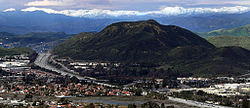| Topatopa Mountains [1] | |
|---|---|
| Topa Topa Mountains | |
 "The Pink Moment" on the Topa Topa bluffs, as viewed from Upper Ojai. | |
| Highest point | |
| Peak | Alamo Mountain |
| Elevation | 7,402 ft (2,256 m) |
| Coordinates | 34°31′48″N119°02′35″W / 34.530°N 119.043°W |
| Geography | |
 Topatopa Mountains [1] | |
| Country | United States |
| State | California |
| County | Ventura |
| Parent range | Transverse Ranges |
| Borders on | Sierra Pelona Mountains and Sierra Madre Mountains |
The Topatopa Mountains are a mountain range in Ventura County, California, north of Ojai, Santa Paula, and Fillmore. They are part of the Transverse Ranges of Southern California.




